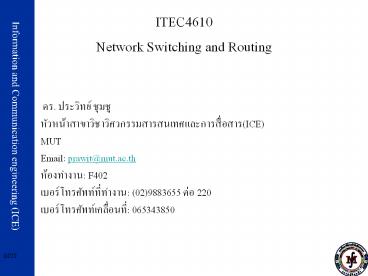ITEC4610 Network Switching and Routing - PowerPoint PPT Presentation
1 / 49
Title: ITEC4610 Network Switching and Routing
1
ITEC4610Network Switching and Routing
- ??. ???????? ?????
- ????????????????????????????????????????????(ICE)
- MUT
- Email prawit_at_mut.ac.th
- ????????? F402
- ????????????????????? (02)9883655 ??? 220
- ??????????????????????? 065343850
2
Class VRouting Algorithms, RIPv1RIPv2
- ??. ???????? ?????
- ????????????????????????????????????????????(ICE)
- MUT
- Email prawit_at_mut.ac.th
- ????????? F402
- ????????????????????? (02)9883655 ??? 220
- ??????????????????????? 065343850
3
?????????????????
- Routing Algorithm
- Distance-vector routing
- Link state routing
- RIPv1
- RIPv2
4
IP components
???????????????? ?????????
???????????????? ??????????
???????????????? ??????????
5
Routing Algorithm classification
- Static or dynamic?
- Static
- routes change slowly over time
- Dynamic
- routes change more quickly
- periodic update
- in response to link cost changes
- Global or decentralized information?
- Global
- all routers have complete topology, link cost
info - link state algorithms
- Decentralized
- router knows physically-connected neighbors, link
costs to neighbors - iterative process of computation, exchange of
info with neighbors - distance vector algorithms
6
Unicast Routing ProtocolsRIP
Objectives
Upon completion you will be able to
- Distinguish between intra and interdomain
routing - Understand distance vector routing and RIP
- Understand link state routing
7
INTRA- AND INTERDOMAIN ROUTING
Routing inside an autonomous system is referred
to as intradomain routing. Routing between
autonomous systems is referred to as interdomain
routing.
8
Autonomous systems
9
Popular routing protocols
10
Routing in the Internet
Path- or distance-vector protocols Link-state protocols
Inter-domain (policy) BGP
Intra-domain (performance) RIP, IGRP, EIGRP(advance DV) OSPF, IS-IS
11
DISTANCE VECTOR ROUTING
In distance vector routing, the least cost route
between any two nodes is the route with minimum
distance. In this protocol each node maintains a
vector (table) of minimum distances to every node
The topics discussed in this section include
Initialization Sharing Updating When to Share
Two-Node Loop Instability Three-Node
Instability
12
Distance vector routing tables
13
???????????? routing table
- Initialization
- Sharing
- Updating
14
Initialization of tables in distance vector
routing
15
Initialization
- ??????????????
- ICMP
- - Router Solicitation
- - Router Advertisement
16
Note
In distance vector routing, each node shares its
routing table with its immediate neighbors
periodically and when there is a change.
17
Updating in distance vector routing of A
18
Trigger Updates
- A cost update distributed immediately in response
to a detected change in the cost estimate for a
route to destination - May delay trigger updates for a short time
- The trigger updates contain information about
only changed routes - RIP
19
Holddowns
- Prevent the reinstatement of old routes
- When a router moves from its routing table a
route to a particular destination, it invokes a
holddown that disables acceptance of new routes
to this detination for a specified time interval - Disadvantage
- Increase the time for routers to learn the
correct new routes
20
??????????????????????????Bellman-Ford algorithm
on a number of hops h
21
????????????????
i/j 1 2 3
1 0 1 5
2 1 0 2
3 5 2 0
Dij(1)
22
????????????????
Dij(2)
i/j 1 2 3
1 0 1 3
2 1 0 2
3 3 2 0
23
????????????????
Node 1s routing Table
To Cost Next
Node 2 1 direct
Node 3 2 Node 2
Node 4 5 Node 2
Node 5 6 Node 2
24
Two-node instability
25
Defining Infinity
26
Split Horizon
27
Problem of Split Horizon
- Node A could not guess that this is due to the
split horizon strategy or because B has not
received any news about X recently
28
Split Horizon and Poison Reverse
29
Three-node instability
30
Defining Infinity
31
Loop-Free Distance Vector Routing
- Distributing enough information in update
messages --gt quickly detect, no prevent routing
loop - Controlling the order in which nodes distribute
update messages and compute routes in response to
an increase in link cost ? Prevent loop but
require - A significant number of message exchanges
- Slow convergence
- Refs
- J. J. Garcia-Luna-Aceves A Minimum-Hop Routing
Algorithm Based on Distributed Information.
Computer Networks 16 367-382 (1989) - DUAL?EIGRP
32
??????
33
????????????????
Node 2s routing Table
To Cost Next
Node 1
Node 3
Node 4
Node 5
34
????????????????
???????????????? node 1 routing table ???
Bellman-Fords algorithm
35
LINK STATE ROUTING
In link state routing, if each node in the domain
has the entire topology of the domain, the node
can use Dijkstras algorithm to build a routing
table.
The topics discussed in this section include
Building Routing Tables
36
Concept of link state routing
Each router knows network topology
37
Link state knowledge
38
Dijkstra algorithm
39
Example of formation of shortest path tree
40
Table 14.1 Routing table for node A
41
??????????????????????????
42
????????Find As routing table
node 1 2 3 4 5
1 0 5 2 3 8
2 5 0 4 8 3
3 2 4 0 8 4
4 3 8 8 0 8
5 8 3 4 8 0
dij
43
????????
44
????????
45
????????
46
????????
47
?????????????
Step P B (cost, NH) C (cost, NH) D (cost, NH) E (cost, NH)
0 A 5,A 2,A 3,A 8
1 AC 5,A 3,A 6,C
2 ACD 5,A 6,C
3 ACDB 6,C
4 ACDBE
48
Comparison of LS and DV algorithms
- Robustness what happens if router malfunctions?
- LS
- node can advertise incorrect link cost
- each node computes only its own table
- DV
- DV node can advertise incorrect path cost
- each nodes table used by others
- error propagate thru network
- Message complexity
- LS with n nodes, E links, O(nE) msgs sent
- DV exchange between neighbors only
- convergence time varies
- Speed of Convergence
- LS O(n2) algorithm requires O(nE) msgs
- may have oscillations
- DV convergence time varies
- may be routing loops
- count-to-infinity problem
49
??????































